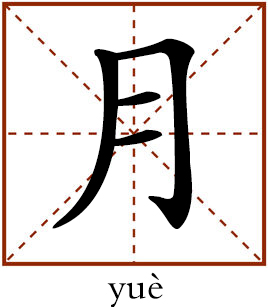Moon

This character refers to the moon. The moon in Chinese culture often represents nostalgia and homesickness. Its changing shape reminded ancient Chinese of the capriciousness of human life; therefore a full moon—mirrored in shape by a mooncake—usually symbolizes completeness and unity.
海上生明月
hǎi shàng shēng míng yuè
Hai shang means “on the surface of the sea.” Sheng means “to rise.” Ming yue refers to the bright moon. This term depicts that the brilliant moon rises out of the sea.
This is the first line from the poem, “Musing on the Moon,” by the Tang poet Zhang Jiuling (678–740). “The sea mirrors th’ rising moon bright;/ Miles apart, our hearts share tonight./Dewy-eyed, I wail this lone night:/ Nostalgia stirs my heart all night./The candle doused, brimming is light./ Dressed in a gown, I’m still dewy slight./ Too hard to hand you sweet moonlight:/ In sleep, will dreams us reunite?” (trans. Xu Jingcheng)
Zhang used to be the chancellor of the Tang Empire. Framed by another official Li Linfu, Zhang was demoted to secretary general at Jinzhou (modern Jingzhou, Hubei Province), where he composed this poem to express his longing for his family and friends far away. The first line is the most famous line of the poem, harnessing pithy and lucid words to depict a magnificent night by the sea under moonlight that resonates throughout the centuries. The second line reflects the traditional view of the moon in Chinese literature. The Chinese believe that when one admires the moon at the same time as another, this can create a special bond among these people, making them feel closer to each other, regardless of where they are. Many poets have mentioned this idea in their poems. A famous example is from a poem by the Song poet Su Shi—“But rare is perfect happiness—The moon does wax, the moon does wane;/ And so men meet and say goodbye./ I only pray our life be long,/ And our souls together heavenward fly!”
Toward the end of the poem, Zhang describes the beautiful concept of holding the moonlight in his hand but being unable to share his handful of moonbeams. This creates the vivid image of a handful of bright light and the powerlessness of the poet to give it to his beloved.
edited by REN GUANHONG
